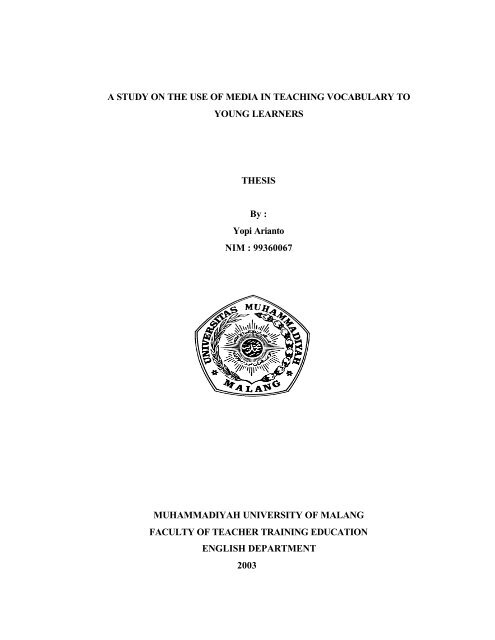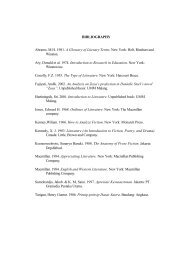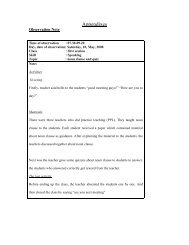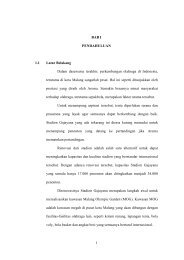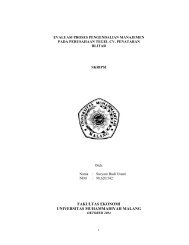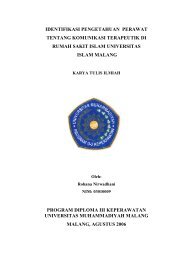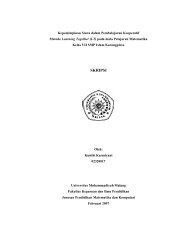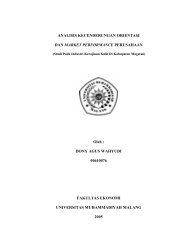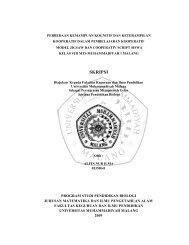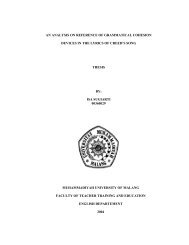A STUDY ON THE USE OF MEDIA IN TEACHING VOCABULARY ...
A STUDY ON THE USE OF MEDIA IN TEACHING VOCABULARY ...
A STUDY ON THE USE OF MEDIA IN TEACHING VOCABULARY ...
You also want an ePaper? Increase the reach of your titles
YUMPU automatically turns print PDFs into web optimized ePapers that Google loves.
A <strong>STUDY</strong> <strong>ON</strong> <strong>THE</strong> <strong>USE</strong> <strong>OF</strong> <strong>MEDIA</strong> <strong>IN</strong> TEACH<strong>IN</strong>G <strong>VOCABULARY</strong> TO<br />
YOUNG LEARNERS<br />
<strong>THE</strong>SIS<br />
By :<br />
Yopi Arianto<br />
NIM : 99360067<br />
MUHAMMADIYAH UNIVERSITY <strong>OF</strong> MALANG<br />
FACULTY <strong>OF</strong> TEACHER TRA<strong>IN</strong><strong>IN</strong>G EDUCATI<strong>ON</strong><br />
ENGLISH DEPARTMENT<br />
2003
UNIVERSITAS MUHAMMADIYAH MALANG<br />
FACULTAS KEGURUAN DAN DAN ILMU PENDIDIKAN<br />
JL. RAYA TLOGOMAS TELP. ( 0314 ) 464318 MALANG<br />
BERITA ACARA BIMB<strong>IN</strong>GAN SKRIPSI<br />
1. Nama Mahasiswa : Yopi Arianto<br />
2. NIRM : 99360067<br />
3. Nomor Induk : 99360067<br />
4. Jurusan : Bahasa Inggris<br />
5. Program Studi : Pendidikan<br />
6. Judul Skripsi : A Study On the Use of Media In<br />
teaching<br />
7. Tgl. Mengajukan Skripsi :<br />
Vocabulary to Young Learners<br />
8. Pembimbing : Dra.H. Fardini Sabilah,M.Pd<br />
9. Konsultasi :<br />
Tanggal Paraf Pembimbing Keterangan<br />
8-5-2003 Pembimbing 1 ( Bab I ACC)<br />
8-5-2003 Pembimbing I ( Bab II ACC)<br />
9-6-2003 Pembimbing I ( Bab III ACC)<br />
28-6-2003 Pembimbing II ( Bab I ACC<br />
28-6-2003 Pembimbing II ( Bab II ACC)<br />
28-6-2003 Pembimbing III ( Bab III ACC<br />
7-7-2003 Pembimbing I ( Bab IV ACC)<br />
7-7-2003 Pembimbing I ( Bab V ACC )<br />
)
10. Tgl. Selesai Menulis Skripsi :_______________________________<br />
11. Keterangan bimbingan Telah selesai :_______________________________<br />
12. Telah Diujikan Dengan Nilai :_______________________________<br />
Malang,…………..<br />
Dosen Pembimbing II, Dosen Pembimbing I,<br />
( Drs. Masduki, MPd ) ( Dra. Fardini Sabilah,M.Pd)<br />
Mengetahui<br />
Dekan,<br />
Drs. Asanul In’am. MM.
CHAPTER <strong>ON</strong>E<br />
<strong>IN</strong>TRODUCTI<strong>ON</strong><br />
I.I Background of study<br />
English is the first foreign language in Indonesia. Many schools or courses<br />
gives English as one of the lessons. It seems that interest in the teaching of English to<br />
elementary school is growing well. Eventough, it doesn’t get maximal result. The<br />
important point is children get basic learning in English to make them easier to learn<br />
further.<br />
Brumfit (1991) explains that young children have more opportunities<br />
than adult.They are learning all the time without having worries and responsibilities<br />
than adult. Their parents, their friends and their neighborhoods help them in learning.<br />
Their brains is more adaptable before puberty than after. And acquisition of language<br />
is possible without self- consciousness at an early stage.<br />
Above all, the most important thing is to give very careful consideration to the<br />
techniques for teaching English to children. Including the use of media as working<br />
with young learners in the elementary classroom can be a rewarding and a demanding<br />
experience. It is necessary to identify what learning a language in school demand<br />
from young children in the school environment can offer them. The implication of<br />
these demands and needs for the teacher is also need to be acknowledged.<br />
As stated before, the use of media as learning aids is mostly believed to<br />
facilitate the English classes. Although this is not only factor to increase the quality<br />
of English teaching, but the media can be as an object or visual representation of the<br />
real thing.<br />
Vocabulary is one of the important points of English learning. It is one of the<br />
language components and as a base of a language. That is why vocabulary building<br />
should be given to children.Getting much vocabulary is better because they will have<br />
stronger base in learning and simple vocabulary is the best choice for children (<br />
colour, number, fruit and so on).
In addition, in teaching learning process, an English teacher for the<br />
elementary level is plays a very important role, because he/she is the most influential<br />
person in the classroom. They can support the success of the teaching and decisions<br />
to be made. Each decision involved a challenge to the skills or accessing a new<br />
situation and coming up with new problems.Furthermore, the efficiency of the use of<br />
media depend on how well a teacher determined and manipulated the good media for<br />
children.<br />
According to Sabilah ( 2000 ), the function of media is to help and to develop<br />
teaching technique of English teacher in teaching four English skills ( speaking,<br />
listening, writing, and reading ), in this study tries to specify only on the vocabulary<br />
building because children will get a base of English strongly by enlarge their<br />
vocabulary. The writer also interested with the study about media in order to<br />
motivate children to learn English with fun and joy.<br />
This study is to know the media that used by the teacher in teaching<br />
vocabulary and how effective is the media. Hopefully, it will be useful especially to<br />
enlarge the knowledge about teaching English for young learner.<br />
1.2 Statement of the Problems<br />
follows:<br />
From the background of study above the writer formulates the question as<br />
1. What kind of media are used by the teacher in teaching<br />
vorcabulary for young learner ?<br />
2. How is the media used by the teacher in teaching vocabulary for<br />
young learner ?<br />
1.3 Purposes of the Study<br />
The purposes of the study are formulated to answer the research questions.<br />
The purposes are as follows :<br />
1. To know the kinds of the media which are used by the teacher in teaching<br />
vocabulary for young learners.
2. To describe the teacher ‘s ways in using media in teaching in teaching<br />
vocabulary for young learner.<br />
1.4 Significance of the Study<br />
The writer hopes that this study will have some advantages for several<br />
persons who consist of .first, English teacher, they can develop the way of teaching to<br />
the better way by using media and increase their quality in teaching learning process,<br />
second, the student will be more interested and enjoyable in the English class.<br />
The last is for the writer, he hopes that he will get much information about<br />
media and vocabulary building for children and gaining a knowledge about teaching<br />
English to young learner that is useful for him in the future carrier as a teacher.<br />
1.5 Scope and limitation<br />
The scope of this study is the use of the media used by the teacher in teaching<br />
English for young learner. The media observered is only limited on the the visual<br />
media such as pictures, flash cards, puppets,etc.<br />
This study is limited on the young learners or beginers level student who join<br />
English private courses in Malang and the teacher who teaches them.<br />
1.6 The Definition of the Key Terms.<br />
The writer gives the definition of the key terms in the order to avoid<br />
misunderstanding and ambiguity in the study, they are as follows :<br />
1. Media: Media are the kind of equipments that are used by the teacher to<br />
help them in teach their student ( Kasim : 1986 )<br />
Vocabulary : According to Horn by ( 1998 : 954 ) ‘’ vocabulary is the total number<br />
of word which make up a language’’
CHAPTER II<br />
REVIEW <strong>OF</strong> <strong>THE</strong> RELATED LITERATURE<br />
In conducting the research, the writer has to collect and review the related the<br />
literature is needed to give theoretical explanations. Weber (1984) states that<br />
literature known as the ground that is prepared and strengthened trough planned<br />
search for and collection of various kind of publication.<br />
The purpose of this chapter is to review related literature to the media of<br />
teaching vocabulary, teaching vocabulary, and teaching English to children.<br />
2.1 Teaching English to Children<br />
Teaching English to children has many aspects. In more formal sense it is<br />
concerned with story telling or sing a song. Nursery rhymes, reading to children, and<br />
planed group tasks. There also an informal phase,which is very important, consisting<br />
of everyday conversation between children and teacher and between children<br />
themselves.<br />
Children have greater immediate read to be motivate by the teacher or the<br />
materials in order to learn effectively. More than anything else, children are curious.<br />
At the same time it is probably true to say that their span of attention or concentration<br />
is considerably less than that of an adult. Children will often seek teacher approval:<br />
the fact that the teacher notices them and shows appreciation of what they are doing is<br />
of vital importance.<br />
It is suggest that children need constants change of activity: they need<br />
activities, which are exciting and stimulate their curiosity: they need to be involved in<br />
something active ( they will usually not sit and listen), and they need to be<br />
appreciated by the teacher, an important figure for them. It is extremely unlikely that<br />
they will have any motivation outside this considerations, and so almost everything of<br />
them is depend on the attitude and behavior of the teacher.
2.1.1 Young Learner Characteristic<br />
According to Beaty (1988) there are four student characteristics.That should<br />
be get attention from the teacher if they want to create the effective teaching.<br />
2.1.1.1 Physical skills.<br />
The physical growth and development of young children during their school is<br />
such obvious occurrence. That we sometimes take it enterily for granted. Children<br />
will of course grow bigger, stronger, more agile and more coordinated in their<br />
movement without outside help.<br />
Teacher should realize that individual differences in development account for<br />
many such lags. Some children are slower than other in developing coordination.<br />
Neorotical problem or even lack of oppurtinity to practice skill may accout from<br />
other. But no matter what the cause of development lags. Classroom workers can help<br />
young children improve booth booth large and motor coordination by providing<br />
activities, material, and equipment that will gives them practice with basic movement.<br />
2.1.1.2 Cognitive skills.<br />
Advacing cognitive skills in young children involves them develop their<br />
intelectual or teaching abilities. Many preschool (course) programs have overlocked<br />
and or down played this area of development. Somehow we have the notion that we<br />
should not teach children to learn until they enter public school at age five or six. The<br />
preschool (course), we declare, should be concern with play.<br />
We seem to have overloocked the fact that young children are progressing in<br />
their intellectual development with or without our help. Cognitive developmrnt just as<br />
important as physical or language development. In fact, they go hand in hand. It<br />
occurs at the same time and it intergrated into every other aspects of the child’s<br />
development.<br />
We also have forgotten that principal direction of young children is not<br />
entertaintment or recreation, as it is among adult, but learning. It is essensial,
therefore, that teacher of young children understand how cognitive abilities develop<br />
and how they can utilize play in their classroom to promote cognitive development<br />
and give it direction.<br />
2.1.1.3 Comunication skills<br />
Most people now agree that the early chilhood years, from birth to school<br />
entrance, are among the most important years of development. At no other time of<br />
life does development advance so rapidly in so short a time. Surely one of the most<br />
remarkable aspects of this period is the acqusition of a native language. From being<br />
totally nonverbal at birth, the young child develops the ability to thing and speak in a<br />
native language by the time he or she enters school.<br />
How does this happen ? Although psycholinguists advance several theories,<br />
the process is still something of a mistery. But we do know certain facts. We know<br />
that the drive to communicate is inherent in all human beings. We also know that<br />
children will strive endlessly to accomplish this goal of communication unless totally<br />
confused or frustrated by circumstances. And we know that if verbal ability is not<br />
developed during these crucial early years, it can affect a child’s thinking and<br />
learning abilities the rest of his life.<br />
Physical or mental disability may prevent language development from<br />
occurring at its normal time or rate. An abusive or uncaring home environment may<br />
discourage children from trying to express themselves verbally. The opposite is also<br />
true; if a child’s every need is fulfilled without his having to utter the word, language<br />
is often delayed. Some twin satisfy the communication drive by developing their own<br />
verbal or nonverbal communication system, thus delaying native language<br />
development.<br />
We also know that modeling behavior is as important here as in other aspects<br />
of development. Children from highly verbal homes seem to speak early and well,<br />
while children from homes where nonverbal communication is the norm are often<br />
delayed in learning to speak.
2.1.1.4 Creative skills<br />
When we speaks of a creative person, we generally mean someone who has<br />
originally ideas, who does thing in new and different way, who use imagination and<br />
inventiveness to brings about novel forms. Can young children be creative like this ?<br />
Not only they can be. Creativity seem to be intuitive in young children,<br />
sometime they are born with. From the very beginning they have the capacity to look<br />
at things, to hear, taste, and touch thing from on enterily original perspective – their<br />
own.<br />
After all, they are new unique beings in the strengh and complex world. The<br />
only way they have to make sense of things around them is to explore the with their<br />
senses : try them out, see what them the way they are, see if they can be any different.<br />
Young children bring to any activity a spirit wonder, great curiosity, and<br />
spontaneous drive to explore, experiment, and manipulate in a playful and original<br />
fashion. This is creativity. It is the same impulse that artist, writer, mucisian and<br />
scientist have.<br />
Yet, you may respond, not all children behave like this, as we note an the<br />
cognitive skiils point. Some children show little interest in anything new. Some will<br />
not engage in activities unless directed by the teacher. These are the children who<br />
need our special assitance in recapturing the creativity they were born with.<br />
2.1.1.5 Native Language<br />
As we know, that sometimes people may interfare the foreign language with<br />
mother language, they tends to make mistakes that occor after they have seen they<br />
words and pronounces the word as the based to do in their own language ( Harrycraft,<br />
in Nurrofiah : 2002 ), for instance there is a contrast between Indonesia language and<br />
English, in our native Indonesia we tend to use some words between pronounces and<br />
written are same, but in English between word and written are usually different.
These kind of contrast should be taught to the student, student should be intruduced<br />
how to pronounce and use English and compare with their own language.<br />
2.2 Media of Teaching Vocabulary<br />
media is the channel of communication. Media are considered as instructional<br />
media when they carry massages with an instructional purposes that is to facilitate<br />
communication.<br />
The teaching media is media that is used to support the instructional<br />
interaction between the teacher and the students ( Latu Heru, 1998 ). Media has a<br />
very important role in increasing the children’s interest to follow and pay attention to<br />
the lesson, because by using media, the student do not only listen to what is said and<br />
taught by the teacher, but also see, notice, and fell it directly. It can increase student<br />
motivation in learning, activate student to give responses, enable the student to repeat<br />
what they learn, stimulate the student to study harder, and encourage the student to<br />
give direct feedback.<br />
Teacher of young learners have to use some visuals in their teaching activities<br />
to facilitate their teaching. Latuheru ( 1984 : 14 ) states that there are two kinds of<br />
teaching media, they are : visual media and audio-visual media.<br />
2.2.1 Visual Media<br />
Foreign language learning needs to be supported by the attractiveness of the<br />
language instructional media, they are needed. The visual media is one type of<br />
language instructional media, then can be easily get than audio visual media. Visual<br />
media classified as follows:<br />
( still picture, flash card, puppet, realia or real object )<br />
2.2.1.1 Still Pictures<br />
Still picture are photographic representation people and things. Picture can<br />
translate abstract concept into more realistic or concrete items teachers can get
various colorful picture from used magazines, posters, or from newspaper or<br />
calendars. According Finocciaro and Bonomo ( 1973 ) every classroom have file of<br />
three of pictures they are (1) picture of individual persons or individual object; (2)<br />
picture of situation in which person are doing something with objects and in which<br />
the relationship of object and/or people can be seen; (3) a series of picture in one<br />
chart.<br />
The advantage of using picture is they are easy to use because they do not<br />
require any equipment and they are inexpensive. Besides they will last long and can<br />
be used in many ways at all levels in the primary or the beginner.<br />
2.2.1.2 Flash Cards<br />
For active recall of vocabularies, the flash card may have a picture one side<br />
and the teacher writes the name of the thing on the other side so that teacher will<br />
know that picture is being shown. The teacher will show the picture one by one and<br />
the student will mention the name of the thing stated on the pictures. If the student<br />
fill, the teacher will mention the first letter of the name of the picture. For example<br />
the teacher will say. ‘’ I like eat banana, my name start with m ‘’. Then the student<br />
will guess the answer, it is expected that is very helpful for the student to remember<br />
the vocabularies.<br />
Flash card is can be in the form of photograph, drawing or picture cut out of<br />
the magazines and newspaper. For a language instruction, drawing are not necessary<br />
the work of art. Stick figure can be drawn on the blackboard or cardboard. The<br />
picture must be enough so the student can be see them clearly.<br />
2.2.1.3 Puppets<br />
Puppets are very popular among children. They have been popular for<br />
hundreds years because they are so much fun. A teacher can do many things with the<br />
puppets. He/she can move them around and make them talk, dance, walk, just like
actors in play. There are a lot of different kinds of puppet among other they are<br />
(1).finger puppet. (2). Card puppet. (3). Glove puppets.<br />
1. Finger Puppets<br />
You can use your fingers as puppet by painting them fingers paint or you can<br />
make mini puppets that slip over your fingertips. You can decorate each finger<br />
in the different way.<br />
2. Card Puppets<br />
Card of puppet are also simple to make. They can be moved with stick taped<br />
to the back, or with hidden card strap.<br />
3. Glove Puppet<br />
A glove puppet fits on to your hand and when you move your finger, puppet’s<br />
arm and head moves. Make a glove puppet of each hand, so that the puppet<br />
can talk each other.<br />
2.3 Audio Visual Media<br />
Audio-visual media is the most powerful aids among the resources for<br />
teaching and learning. By using audio-visual media the object can not only show but<br />
also heard and seen.<br />
There are three kinds of audio visual media (1).cassete recorder .(2). The tape<br />
recorder.(3). Overhead projector<br />
2.3.1 Cassete Recorder<br />
Songs, stories, plays, operas, poems and speeches, as well as the voice of<br />
people in the market ( all of available on the record ) are in valuable teaching foreign<br />
language and should be used at which ever step in the lesson they would most<br />
appropriate. Language learning can combined with recreation or aesthetic<br />
appreciation for a change of face in the classroom to enlarge motivation.
2.3.2 The tape recorder<br />
When the tape recorder exist, the teacher should make every attempt to use<br />
them extensively. Many kinds of supplementary materials can be places on tape:<br />
‘pronunciation drills where contras are featured; sentences of varying length to teach<br />
rhythm; sentence illustrating intonation pattern; dialogs and stories for listening and<br />
repeating; aural comprehension exercise and event test.<br />
2.3.3 Overhead projector<br />
The teacher of young children is need this kind of equipment. Presenting the<br />
material using overhead projector allows the teacher to face the children all the time<br />
and provides the children with a common focus of attention. The teacher can come<br />
back with the same material whenever he or she want to and the teacher can use the<br />
same material with different classes.<br />
2.4 Teaching Vocabulary<br />
According to Richard in Nurrofiah (2001) vocabulary is the one of the most<br />
important aspect of the foreign language learning. Further, vocabulary is meaning<br />
associated with spelling form. The focus of definition is in the meaning. Thus,<br />
teaching vocabulary is the instruction that used to develop student’s ability to use<br />
vocabulary items in free in meaning conversation.<br />
2.4.1 The Important of Vocabulary<br />
Wallace (1982) argues that vocabulary is one of the important part of<br />
languages, because if we speak a language, we need several word to convey ideas. So<br />
people can understand what we mean. He also mention two of the Important of<br />
vocabulary, that are:<br />
1. Language exist in two form, the spoken and written. Both of them need<br />
vocabulary to develop the existence it self.<br />
2. Actually, vocabulary is one of the important of the four language skills.
Therefore, vocabulary is very needed for production in learning English as a<br />
foreign language rather than only needed for recognition it.<br />
2.4.2 The Role of Vocabulary in Language<br />
Principally, the aim of teaching language is in order to make students are able<br />
to spech, listen, read and write. Furthermore, Tarigan (1984) states many of roles of<br />
vocabulary in language, they are :<br />
1. quantity and quality of someone vocabulary is a better individual index for<br />
his/her mental development in which, the quality of someone language ability<br />
depends on quantity and quality of vocabulary that she/he has.<br />
2. development of vocabulary is the conceptual development, which is one of the<br />
educational goals for everyone in order to mastery they language competence.
CHAPTER III<br />
RESEARCH METHODOLOGY<br />
This chapter discusses about the methodology of the study related to research<br />
design, research subject, research instrument, data collection and data analysis.<br />
3.1 Research Design<br />
In this study the writer uses descriptive research design, according to Ary<br />
(1972),descriptive method is conducted to describe a situation and what exist in the<br />
time of study in order to get information.<br />
According to Gay (1979) descriptive research is designed to obtain<br />
information concerning the current status of phenomena. Descriptive studies invalue<br />
collecting data in order to test the hypotheses or to answer the questions concerning<br />
the current status of the subject of the study. Gay has stated a descriptive study<br />
determines and reports the way thing are (1979).<br />
In the sense of descriptive study, this study attempts to describe the media to<br />
teach vocabulary for young learner of English courses in Malang.<br />
3.2 Research subject<br />
The subject of this study are the students and the teachers of Tk Al-kautsar.<br />
The learner were about 4 up to 7 year old, other subject examined is the media of<br />
teach vocabulary used by the teacher of Al-kautsar.<br />
3.3 Research Instrument<br />
The researcher used two kinds of instruments to collect the data, they are<br />
observation and interview.
3.3.1 Observation<br />
Observation is used to get the data on the media used by the teacher in<br />
teaching vocabulary. The researcher observe the media and classify the media. The<br />
score of the student will be collected to know how the teacher way to teach and use<br />
media and how the student respon.<br />
3.3.2 Interview<br />
Dialogue with the teacher was conduct to grasp information concerning<br />
media, classroom activities, and constrain in teaching vocabulary using media.<br />
According to Donal Ary there are two types of interviews, those are structured<br />
interview and unstructured interview (1979).<br />
The interview used in this study is unstructured interview, the researcher gives<br />
the question concerning to the media. The researcher chooses this kind of interview<br />
because an unstructured interview is flexible and usually pained it suit subject and<br />
condition within which the interview takes place. The interview of this study is for<br />
the teacher.<br />
3.4 Data collection<br />
Based on the research instrument above, there are some procedures that<br />
conducted to complete this study:<br />
teaching.<br />
1. The researcher observed every class, to observes media used in<br />
2. The researcher conducted the interview directly after observation in class to<br />
confirm the data connect with the observation, the observation<br />
and interview that conducted by the researcher in every class is same.<br />
3. Research is held on june 2 until 14 june 2003.
3.5 Data analysis<br />
Data analysis was an important step of research, because by doing it the<br />
researcher will get the answers to the problems which are questioned and could be<br />
used to conclude the researcher analyzing to the data as follows:<br />
research.<br />
1. Formulating the data based on the problem statement.<br />
2. Discard the data which is unsuitable with the purpose of the study.<br />
3. Describe into sentences and deep descriptions.<br />
The data obtained from the respondent were analyzed by applying description
CHAPTER IV<br />
RESEARCH F<strong>IN</strong>D<strong>IN</strong>G AND DISCUSSI<strong>ON</strong><br />
This chapter is needed to present the result of the study and the discussion of<br />
the study. It has been stated before that in collecting the data concerning with the<br />
media used to teach vocabulary to the student of TK Al-Kautsar, the researcher uses<br />
observation and interview. The process of data collection was conducted on Saturday<br />
and Thursday on 25 th May and 2 nd June 2003.<br />
After collecting the data, the researcher was formulating the result based on<br />
theories and concept in the related literature, then analyzed it based on the analysis<br />
procedure mentioned in chapter three in order to answer the problem stated before.<br />
4.1 Research Finding<br />
There are two instruments dealing with the analysis of the data collection.<br />
First is the data that researcher got from the interview. The second is the data<br />
gathered from the observation. The data of this research was obtained from the<br />
Headmaster and the teacher who teach English in class B1,B2,B3 and B4.<br />
4.1.1 The Kind of Media for The Students of TK Al-Kautsar<br />
The media used by the teacher for the student in teaching English were<br />
various. The media that used were CD, still pictures ( a picture in the paper and the<br />
picture can be anything that needed by the teacher ) , drawing blackboard and realia.<br />
The teacher of TK Al-Kautsar always uses the picture as the media that states<br />
in CD, still picture or by drawing blackboard. The teacher of TK Al-Kautsar realized<br />
that the function of media is very important to get the students attention. To make it<br />
clear, the following media were explained.
a. CD ( compact disc )<br />
The reason why the teacher uses CD is because it makes the teacher easier to<br />
introduce the vocabulary to their students The teacher turns on the CD player and ask<br />
the students to repeat the word that appear in every picture, and in the last of the<br />
lesson the teacher reviewing the words which already taught. In this case, the teacher<br />
applies it in every class ( B1, B2, B3 and B4 )<br />
b. Blackboard Drawing<br />
The teacher uses drawing blackboard to teach the student about the word that<br />
have relation with the village like mountain, field or river. This media were often<br />
used by the teacher because it does not need much preparation, the teacher only needs<br />
a broardmarker and draw the picture depend on the theme.<br />
c. Still Picture<br />
There are many pictures in the wall of the class, the teacher takes the picture<br />
that needed and shows the picture one by one to be guessed by the student in<br />
Indonesian language and the teacher gives them the English word. For example, the<br />
teacher takes the solar system picture then asks the student to count the planets and<br />
tell them about planets, stars, and sun.<br />
Still picture is very useful for the teacher, it can make the students learn two<br />
things for example, the teacher takes monkey‘s picture and asks the student ‘’what is<br />
the monkey doing ? ‘’ it means that the teacher has already given the students two<br />
ways vocabulary teaching. She already taught the students about monkey and what<br />
monkey was doing.
d. Realia<br />
The researcher shows a square that has different colors and throws the square<br />
to the floor and the students try to guess the color shown above. There are black, blue,<br />
white, yellow, red, and green. Before throwing the square, the teacher wrote the<br />
words of every color to the Indonesia meaning. The square of color is interisting<br />
when the teacher throws it to the floor and the students waits to guess what the color<br />
will shows in the top of the square, maybe it will makes the situation of the class is<br />
crowded but it’s ok if the students is learning.<br />
The other realia used is the furniture inside the class such as table, chair, and<br />
cupboard. and the part of the class like windows and door, the teacher is only need to<br />
point to the things and the students guess.<br />
English is given only in Saturday and in 30 minutes in every meeting and the<br />
teacher only teaches one theme.<br />
4.1.2 The Way of Using Media<br />
In this section the researcher presents the data concerning to the use of media<br />
to teach vocabulary for the students of Al-Kautsar. Based on the interview and<br />
observation, the researcher got some information about the media in teaching<br />
vocabulary for young learners.The students are divided into four class (B1,B2,B3,<br />
and B4). In this case, B class is the second year class and every class is 30 students.<br />
The student are divided into 3 groups, so each group consists 10 student with the<br />
different seat.<br />
The media used by the teacher in teaching vocabulary are CD, still picture,<br />
blackboard, and realia. Concerning to the CD, the teacher turns on the CD and guided<br />
the student to look at the pictures that appear in the television. For this media the<br />
teacher told about the alphabet, after spelling the letter together the teacher asks every<br />
group to spell those words together, and the last was every student should spell the<br />
letter by themselves.
In using the picture, the teacher shows the solar system picture and asks the<br />
students to count how many planets there are. The students on the class B1 have good<br />
eager to count in English. The teacher also gives the other words like star, cloud, and<br />
moon. The teacher evaluates the student by asking every group to repeat counting in<br />
English.<br />
Drawing blackboard is used by the teacher to teach them about ‘’my country’’<br />
and ‘’village’’. The teacher only needs to bring a broardmarker and a little beat of<br />
drawing ability. She just draws the flag and a map of our country. Before coming to<br />
the material, the teacher does brainstorming to the students. She asks about the<br />
country we live and the color of our flag.<br />
Realia is used to introduce them about the color and the things in the class<br />
room. The teacher is using a square that has different color in every side. The teacher<br />
writes the color in English and Indonesian meaning then throws the square to the<br />
floor and the students will guess the color that shows above group by group. The<br />
things inside the class are also useful for the teacher to teach vocabulary such as,<br />
table, ruler, blackboard, and so on. The teacher did not found any difficulty in using<br />
realia, because those things have already exist in the class. All the teachers have to do<br />
is only pointing to the thing and the student will try to say it in English words.<br />
Based on the interview done by the researcher, class B3 and B4 also get the<br />
same treatment like the teacher give in class B1 and B2. its because in TK Al-kautsar<br />
have no specific classification.<br />
In every class ( B1,B2,B3, and B4 ), they use same material based on the<br />
curriculum. When the teacher knows that the students could receive more vocabulary,<br />
she should give them more vocabulary, even tough, only two or three words.
4.2 Discussion<br />
Basically, there are many media that are used by the teacher in TK Al-<br />
Kautsar, and those media are very helpful for the teacher because they attract the<br />
students’ attention. CD is the most favorite media, the students just sit and wait the<br />
picture that will appear on the television. The CD is published by BBC.<br />
Realia is used in limited activities, because the teacher has the theme as a<br />
limitation. The theme taught by using realia is about the things in the surrounding.<br />
This is good for the students because they will learn vocabulary from the things that<br />
are familiar with them.<br />
The media used by the teacher of TK Al-kautsar were good enough and also<br />
interesting. The most appropriate media is still picture and blackboard drawing. still<br />
picture makes the students concentrate but if the class consists of 30 students the<br />
teacher should bring the bigger picture. Blackboard drawing is also interesting for<br />
student but it needs teacher’s ability in drawing. If the teacher can not draw well she<br />
should start to draw a simple subject such as a mountain, or a house.<br />
Based on the observation and interview, the students are interested in still<br />
picture and drawing blackboard. On those media they much enjoy the lesson when<br />
the teacher draws a picture or when the teacher takes one of picture on the wall. The<br />
media given to the students should be appropriate with their ability. In giving the<br />
material, of course it should be attractive and interesting. The good media can<br />
increase student motivation in learning, activate the student to give respond, repeat<br />
what they have learnt, and encourage them to give direct feed back.
CHAPTER V<br />
C<strong>ON</strong>CLUSI<strong>ON</strong> AND SUGGESTI<strong>ON</strong><br />
This chapter was deals with the conclusion and suggestion related to research<br />
finding and discussion. For this purpose, the researcher presents the conclusion of<br />
research problem and the suggestion to the English teacher and other researchers.<br />
5.1 Conclusion<br />
Based on the finding of this research, the following conclusion can be<br />
described. English teacher of TK Al-Kautsar used CD, still picture, drawing<br />
blackboard, and realia.<br />
To teach English, the teacher used the media in every meeting. The media must<br />
be chosen according to the theme and the student ability in absorbing the material, of<br />
course the media should be atractive and interested for the student. the instructional<br />
media can increase student’s motivation in learning, activated the student to give<br />
responds, enable them to repeat what they learned, and encourage them to interest<br />
with English.<br />
Based on the researcher’s observation and interview. From all the media that<br />
use, CD are the most interesting media . this media let the student to concentrate in<br />
watching and hearing English word and picture and put them in their mind. And from<br />
all the media, drawing picture was very often used by the teacher. The reason is the<br />
students are active in guessing picture drawn by the teacher.
5.2 Suggestion<br />
To improve the teaching of English for the student to the student of TK Al-<br />
kautsar Malang, the researcher gives suggestions as follows :<br />
1. The teacher should know what the media are mostly appropriate for the<br />
students.<br />
2. The researcher hopes that the teacher of young learner to be more innovative<br />
and creative in using media.<br />
3. The teacher should be more creative in selecting the media in teaching<br />
learning process to attract the students’ attention.<br />
4. The teacher should considering the student’s characteristic in choosing the<br />
media because some students may have low motivation and lack of attention.<br />
5. All the teachers of young learner should try to create and combine the media<br />
to attract student. The good media is useful to make the student enjoy and<br />
happy in learning English.<br />
6. The time is too short to teach English ( 30 minutes ). The students will get<br />
limited vocabulary if the time is too short
5.2.2 Suggestion to Other Researchers<br />
Because the researcher was doing this research in limited time. He realizes that<br />
this thesis has not been complete yet. There are so many aspects that have not been<br />
covered in this research. That is why the researcher hopes the other researcher will<br />
discuss about the media by using other reliable or different subject.<br />
5.2.3 Suggestion To The teachers of The Young Learners<br />
A teacher of young learners may found a few difficulties when she is teaching.<br />
Such as, students didn’t give attention or move around the class, it is suggested to the<br />
teacher to use media. Because the media will makes the students focus to the lesson.<br />
And the media must be selected correctly depend on the characteristic of the class.<br />
5.2.4 Suggestion to The Readers<br />
The researcher hopes this thesis can be useful not only for the English teachers<br />
and the other researchers, but also to the reader of this thesis. The researcher reminds<br />
the readers about the important of English teaching to young learners, because the<br />
learner are potential human resources and our job to guide them to the better quality<br />
of English. And the readers may try the media like CD or pictures when teach English<br />
to them.
REFERENCE<br />
Ary, Donal.1970. Introducing to Research in Education, Ney York : Holt Rinehart<br />
and Winstor.Inc<br />
Brumfit, christoper. Jayne Moon and Roy Tange. 1991. Teaching English to<br />
Children. London, London : Harper Colling publisher<br />
Beaty, Jeanice, 1988.Preparing For Primary School Teacher. London<br />
Finochiaro, Mary. 1964: Teaching Children Foreign Language. New York . New<br />
York Mcgraw . Hill Company.<br />
Kasbolah., Kasihani. : 1995 Teaching English to Young Learners. IKIP Malang<br />
Nurrufiah , Ade . 2002. A Study on the Technique used of in Introducing New<br />
Vocabulary for the Begginer Level of Planet Kids English Course in<br />
Malang. Unpublish Thesis. Malang UMM.<br />
Sabilah, Fardini. 2000, A Closer Look at the Used of The Media in English Classes at<br />
Elementary Schools. Unpublish Proposal, Malang. UMM<br />
Scoot, Wendy A, And Lisbeth H. Yteberg, 1990, Teaching English to Children,<br />
London. Longman


